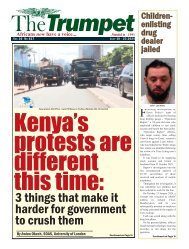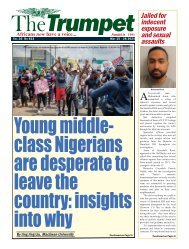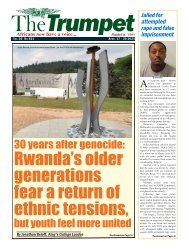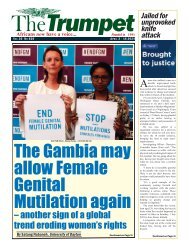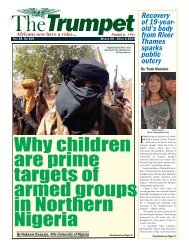The Trumpet Newspaper Issue 624 (May 29 - June 11 2024)
South Africans go to the polls to choose a new government: what's different this time
South Africans go to the polls to choose a new government: what's different this time
You also want an ePaper? Increase the reach of your titles
YUMPU automatically turns print PDFs into web optimized ePapers that Google loves.
Page2 <strong>The</strong><strong>Trumpet</strong> MAY <strong>29</strong> - JUNE <strong>11</strong> <strong>2024</strong><br />
News<br />
South Africans go to the polls<br />
to choose a new government:<br />
what’s different this time<br />
Continued from Page 1<<br />
South Africa’s seventh general election since democracy in 1994, set for <strong>29</strong> <strong>May</strong> <strong>2024</strong>, takes place<br />
under circumstances different from any other election in the history of the nation. Some view the hotly<br />
contested national and provincial elections as a watershed moment for the country. We asked political<br />
scientist Dirk Kotze to explain the changed circumstances.<br />
<strong>The</strong>re’s a new electoral law in place.<br />
What does this mean for the ballot<br />
paper and voters’ choices?<br />
<strong>The</strong> new electoral system means that<br />
voters will receive three ballot papers instead<br />
of the two they got in the past: two national<br />
ballots (the regional and compensatory<br />
ballots) and one provincial ballot paper.<br />
<strong>The</strong> first national ballot has a list of<br />
political parties that are contesting 200<br />
National Assembly seats across the country.<br />
<strong>The</strong> second is the regional ballot in each<br />
province: it is for political parties and<br />
Solicitor and Partner<br />
of an award-winning<br />
law firm<br />
S.A.J<br />
LEGAL<br />
based in the heart of<br />
Central London -<br />
Kolade Jegede<br />
specializes in:<br />
Immigration - Preparing of all<br />
Immigration matters, including<br />
Appeal Challenges and Tribunal<br />
Representation.<br />
Employment - Handling all types<br />
of Employment Claims.<br />
Family Law - Dealing with Divorce<br />
Applications, Financial Arrangements,<br />
and Applying for Non-Molestation /<br />
Occupational Orders.<br />
First consultation is FREE.<br />
T: 07818 <strong>11</strong>8656 E: kj@saj.legal<br />
independent candidates in the nine provinces<br />
contesting the other 200 seats in the National<br />
Assembly. In total there are 400 seats in the<br />
National Assembly. <strong>The</strong> third is the<br />
provincial ballot for the provincial<br />
legislatures. South Africa has nine provinces.<br />
Voters will therefore have to make three<br />
choices: two for the National Assembly and<br />
one for their provincial legislature. It creates<br />
the possibility of “strategic” voting. Voters<br />
can choose between different parties (or a<br />
party and an independent candidate) at the<br />
national level. It will also be possible to vote<br />
for one party at the national level and for<br />
another party (or an independent) at the<br />
provincial level.<br />
<strong>The</strong> amended electoral system also<br />
allows independent candidates to stand at<br />
both the national and provincial levels for the<br />
first time.<br />
<strong>The</strong> new system is therefore a<br />
combination of party lists and individual<br />
candidates. <strong>The</strong> new lists for the provincial<br />
legislatures look the same as the national<br />
“regional” lists.<br />
What about the choices on the ballot<br />
paper?<br />
Statutory Amendment (Date of Birth)<br />
I, Miss Adiatu Victoria Ramos - an Indigene of<br />
Lagos Island, Lagos State, Nigeria; known with a<br />
previous Date of Birth of 8th February 1970 wish<br />
to state that my correct Date of Birth<br />
is 8th February 1961.<br />
Nigeria High Commission London, Immigration &<br />
Nationality UK, Department of Social Security UK,<br />
Department for Work & Pensions, South<br />
Gloucestershire Council and NatWest Bank UK,<br />
should please take note<br />
<strong>The</strong> options on the national ballot paper<br />
increased from 48 parties in 2019 to 52 in<br />
<strong>2024</strong>. In 1994, 19 parties participated in the<br />
first national election. <strong>The</strong> number of parties<br />
has increased gradually over 30 years, not<br />
suddenly since the most recent elections.<br />
During the 30 years, the number of<br />
parties with seats in the National Assembly<br />
has remained relatively constant at about 14.<br />
In 1994, three – namely the African National<br />
Congress (ANC), New National Party (NNP)<br />
and Inkatha Freedom Party (IFP) – each<br />
received more than 10% support at the<br />
national level. In 1999, this changed with the<br />
NNP’s dramatic loss of support and the<br />
emergence of the Democratic Alliance (DA).<br />
<strong>The</strong> NNP party was dissolved in 2005.<br />
<strong>The</strong> Inkatha Freedom Party also declined<br />
between 2009 and 2016, but started to<br />
recover thereafter. <strong>The</strong> Congress of the<br />
People (Cope) (2009) and the Economic<br />
Freedom Fighters (EFF) (2014) emerged as<br />
newcomers. Cope has largely disappeared<br />
while the DA and EFF have increased their<br />
support to between 10% and 20%.<br />
<strong>The</strong> ANC, DA, EFF and IFP are therefore<br />
the main options in <strong>2024</strong>, followed by a host<br />
of small parties with 1%-2% support. <strong>The</strong><br />
latest addition is the uMkhonto weSizwe<br />
Party (MK Party) led by former President<br />
Jacob Zuma. Its support is still untested but it<br />
appears to have much potential in the<br />
KwaZulu-Natal province. Opinion polls<br />
suggest a national presence for the party of<br />
about 8%. In principle it means that the main<br />
contest is between about five to eight parties.<br />
This establishes a truly multi-party<br />
dispensation. It also enables a number of<br />
options for coalition governments.<br />
<strong>The</strong> ruling party risks losing 50%.<br />
What does this mean?<br />
<strong>The</strong> <strong>2024</strong> election might become a<br />
milestone because, for the first time since<br />
1994, a national coalition government is a<br />
possibility. It will differ from the<br />
Government of National Unity of 1994-1999<br />
(consisting of the ANC, NNP and IFP),<br />
which was an oversized, grand coalition<br />
agreed upon before the election as part of the<br />
negotiated transition package. It was thus not<br />
a conventional coalition government.<br />
<strong>The</strong> possibility that the ruling ANC might<br />
receive less than 50%+1 of the votes at the<br />
national level or in some of the provincial<br />
legislatures will be highly significant. That’s<br />
because the ANC has been a dominant party<br />
for 30 years.<br />
This is not unique and dominant parties<br />
were in the past or still are in power in India,<br />
Sweden, Japan, Botswana, Mexico, Namibia,<br />
Continued on Page 3









